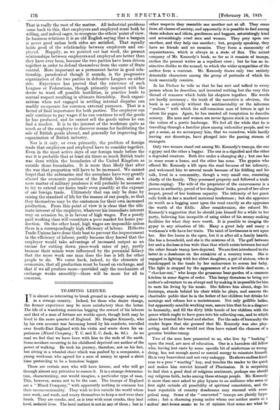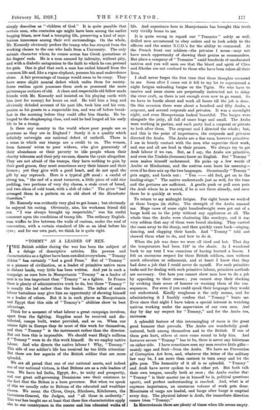TRAMPING LEISURE.
IT is almost as interesting to break ground in estrange society as in a strange country. Indeed, for those who desire change, the •former experience may be more satisfactory than the latter. Thelife of .a wandering musician begging the reward of his labours and that of.a man of fortune are worlds apart, though both may be lived in the same quarter of England. Mr. Douglas Kennedy, who by his own account was becoming bored -by his comforts, travelled over South-East England with his violin and wrote down his -ex- periences (Mixed Company; T. C. and K C. Jack, 4s. 6d.). As we read we feel that we have been with him to the ends of the earth. Some accident occurring in his childhood deprived our author of the power of walking. He took his journey, therefore, not on his feet, but sitting in a wheeled chair which was pushed by a companion, a young workman who agreed for a sum of money to spend a short time pretending to be a homeless beggar.
There are certain men who will have leisure, and who will go through almost any privation to ensure it. It is a strange determina tion, characterizing, one would imagine, a particular type of man. This, however, seems not to be the case. The tramps of England are a " Mixed Company," 'with apparently nothing in common but their unconventionality. They wish to live outside the world where men work, and wash, and weary themselves to keep a roof over their heads. They are cranks, and, as is true with most cranks, they lead hard, isolated lives. The herd instinct is not in any of them ; but in
other respects they resemble one another not at all. They come from albolasses -of society, and apparently it is possible to find among them- scholars and idiots, gentlemen and beggars, astonishingly kind and astonishingly cruel men and women. They prey upon one another, and they help one another ; but, properly speaking, they have no friends and no enemies. They form a community of aequaintanoes, which is always in a state of flux. The mixed company of Mr. Kennedy's book, so 'far as it consists of tramps, strikes the present writer as a repellent crew ; but he has an in- stinctive dislike to the nomad, to which the wider sympathies of the author form a contrast. Mr. Kennedy draws only two entirely detestable characters among the group of portraits of -which his book essentially consists.
In his Preface he tells us that he has met and talked to every 'person whom he describes, and invented nothing but .the very thin thread of romance which holds his chapters together. His words are hardly necessary ; the truth of the narrative is -obvious, the book is so entirely without the sentimentality or the inhuman " realism " with which the self-conscious man of letters is apt to adorn his pages. Again, he has resisted all temptation to -describe scenery. His men and women are never figures stuck in to enhance the values of a poetic landscape. We feel all the while that he is travelling through a familiar place among unfamiliar people, and we get a sense, as we accompany him, that we ourselves, while hardly leaving our doorsteps, have plunged into the passing stream of strangers.
Only two women stand out among Mr. Kennedy's 'tramps, the one a gypsy and the other a beggar. The one is a dignified and the other a degraded creature. Both live under a changing sky ; but one has in some sense a home, and the other has none. The gypsies who offered Mr. Kennedy a lift upon the road because of his infirmity, and welcomed. him to several meals because of his fiddling and his talk, lived in a community, though a very small one, consisting chiefly of the family. They possessed property and followed a trade (horse-coping). The wife of the proprietor of the caravanserai is a person in authority, proud of her daughters' looks, proud ofher-silver teapot, proud of her business capacity. The infirmity of her guest calls forth in her a marked maternal tenderness ; but she appraises its worth as a begging asset upon the road exactly as she appraises the worth of the fiddle. After consideration, she refused Mr. 'Kan erly's suggestion that he should join himself for a while to her party, believing him incapable of using either of his moneymaking facilities for what they were worth. it is possible to imagine the :gypsy in any situation of life. Many a great lady and many a :workman's wife have her traits. The taint of lawlessness is not upon her. Her fire burns in the open, but it is after all a family hearth. She has a household, and she is the mistress of it. The gulf between her and a duchess is leas wide than that which exists between her and the other female tramp here depicted. Weare first introduced to the lather in a doeshowie on the outskirts of a country town. She is engaged infighting with her eldest daughter,,a girl of sixteen, who is 'handicapped in the tussle by her endeavours to screen her -baby. The fight is stopped 'by the appearance of a -terrible deaf-mute, a chucker-out," who keeps the gruesome bear-garden of -a common kitchen in some degree of order. This harpy threatens to bring our author's adventure to an abrupt end by making it impessiblefor him to earn his living by his music. She follows him about, dogs his footsteps, stands behind his chair -while he plays, and assures the charitable public that he is the father of her children but drinks hie earnings and refuses her a maintenance. Not only gullible ladies, but apparently-sensible working men, assure him that he is a disgrace to humanity, and fill the dirty little hands of her children with the pence which ought to have gone into his collecting-43m, and to which alone he trusted for bread and-shelter. For the sake of humanity the 'reader hopes that she guessed that -Mr. Kennedy was also play- acting, and that she would not -thus have ruined the chances of a genuine brother-tramp.
Two of the -men here presented to us, who live by ." busking " upon the road, are men of education. One is a harmless old fellow -who, having lost caste by some specific bit of misfortune or wrong- doing, has -not enough moral or mental energy to reinstate himself. He is very benevolent and not very unhappy. Heshows endless kind- ness to a poor " wanting " -boy, and touches the reader to the quick and makes him convict himself of Pharisaism. It is surprising to find that a good deal of religious sentiment, perhaps one should say religious faith, lurks among these strange people. Mr. Kennedy is more than once asked to play hymns to an audience who seem at first sight outside all possibility of spiritual consolation, and the least reputable of country dosshouses may resound with evan- gelical song. Some of the " converted " tramps are plainly hypo- crites ; but a charming young sailor whom our author meets at a sailors'-rest-house seems to be of opinion .that some are what he simply describes as "children of God." It is quite possible that certain men, who. centuries ago might have been among the earlier begging friars, now lead a tramping life, preserving a kind of msrs- terious innocence- among their evil surroundings. On the whole, Mr. Kennedy obviously prefers the tramp who has strayed from the working classes to-the one who hails from a University. The only satanic character whom he comes across has Greek quotations at his fingers' ends. He is a man amused by infirmity, without pity, and with a diabolic antagonism•to the faith to which he can-pretend for gain. One is glad that such a man has exiled himself from the common life and, like a rogue elephant, pursues his mad malevolence alone. A fair percentage of tramps would seem. to be crazy. They have, some. alight mental_ defect which unfits. them for society. Some restless spirit possesses them suoh as possessed the more picturesque outlaws of old. A clean.and respectable old fellow made friends with Mr. Kennedy and insisted on hia playing cards with him (not for money) for hours on end. He told him a long and obviously deluded account of his past life, took him and his corn. panion as his guests to a respectable inn, and was off before break- fast in. the morning before they could offer him thanks. He be- longed to the shopkeeping class, and said he had longed all his early life to be a tramp.
Is there any country in the world where poor people are so generous as they are in England ? Surely it is a quality which infinitely outweighs our national defect of unthrift. There is a sense in which our tramps are a credit to us. The women, from farmers' wives to poor widows, who give generously of their abundance or their poverty to idle people whom their charity tolerates and their pity excuses, disarm the cynic altogether. They are not afraid of the tramps, they have nothing to gain by their good graces, they must sometimes envy their leisure and their licence ; yet they give, with a good heart, and do not spoil the gift by any reproach. Here is a typical gift meal : a canful of strong tea, " the end of a meat turnover, a.little piece of cold rice pudding, two portions of very dry cheese, a stale crust of bread, and two slices of cold toast, with a slab of cake." The giver " had arranged them in a pattern on an old sheet of the Manchester Guardian."
Mr. Kennedy was evidently very glad to get home ; but obviously he enjoyed his outing. Obviously, also, his workman friend did not. " I was always brought np respectable," was his rueful comment upon the conditions of tramp life. The ordinary English- man whites to live between the walls of custom, under the roof of convention, with a certain standard of life as an ideal before his eyes ; and for our own part, we think he is quite right.



























 Previous page
Previous page